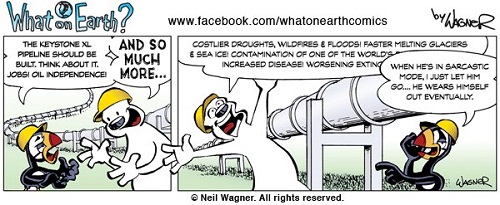
Dana's Cherrypicking to Deny Continued Ocean and Global Warming and Rob Painting's Carbon Dioxide the Dominant Control on Global Temperature and Sea Level Over the Last 40 Million Years caused commentors juices to flow. The ensuing discussions covered a lot of territory and are instructive in their own right. Contrary perspectives serve a useful purpose by challenging SkS authors to better explain the science of climate change.

Reposted with permission of Neil Wagner.
I HOPE the president turns down the Keystone XL oil pipeline. (Who wants the U.S. to facilitate the dirtiest extraction of the dirtiest crude from tar sands in Canada’s far north?) But I don’t think he will. So I hope that Bill McKibben and his 350.org coalition go crazy. I’m talking chain-themselves-to-the-White-House-fence-stop-traffic-at-the-Capitol kind of crazy, because I think if we all make enough noise about this, we might be able to trade a lousy Keystone pipeline for some really good systemic responses to climate change. We don’t get such an opportunity often — namely, a second-term Democratic president who is under heavy pressure to approve a pipeline to create some jobs but who also has a green base that he can’t ignore. So cue up the protests, and pay no attention to people counseling rational and mature behavior. We need the president to be able to say to the G.O.P. oil lobby, “I’m going to approve this, but it will kill me with my base. Sasha and Malia won’t even be talking to me, so I’ve got to get something really big in return.”
No to Keystone. Yes to Crazy, Op-ed by Thomas Friedman, New York Times, Mar 9, 2013
ABC News interviewed John Cook about the role of SkS in the Reality Drop project.
Dana's Cherrypicking to Deny Continued Ocean and Global Warming was re-posted on Climate Progress.
Shauna Theel at Media Matters referenced the SkS 1970s ice age predictions myth rebuttal while debunking the myth that climate science is 'new science'.
Stephen Leahy endorsed Skeptical Science as one of the best sources to separate climate fact from fiction.
Max Greenberg at Media Matters used The Escalator and 'where is global warming going' graphics in debunking a Heartland/Forbes blog post wrongly claiming that global warming has magically stopped.
Jos Hagelaars in a guest post on Bart Berheggen's Our Changing Climate referenced the SkS hot spot rebuttal and 'human fingerprint of global warming' page in responding to claims from John Christy about the Klotzbach et al. paper on tropospheric warming.
In investigating how climate science denial blogs win online awards, Daily Kos discussed the SkS withdrawal from the Bloggies.
Takver Takvera at Climate Citizen re-posted Dana's China Takes a Leading Role in Solving Climate Change.
The Oregon Climate Change Research Institute (OCCRI), based at Oregon State University (OSU), is a network of over 100 researchers at OSU, the University of Oregon, Portland State University, Southern Oregon University, and affiliated federal and state labs. In 2007, the Oregon state legislature created OCCRI and tasked it with: fostering climate change research among faculty of the Oregon University System (OUS); serving as a clearinghouse for climate information; and providing climate change information to the public in an easily understandable form.
OCCRI is the anchor institution for two federally funded regional climate science centers. The Department of the Interior’s (DOI) Pacific Northwest Climate Science Center (CSC) is one of eight planned CSC’s. The CSC will serve as a resource for DOI agencies in providing necessary science in advising policy decisions. The National Oceanic and Atmospheric Administration’s (NOAA) Pacific Northwest Climate Impacts Research Consortium is one of 11 Regional Integrated Sciences and Assessments (RISA) projects. The NOAA RISA will engage and support a broad number of stakeholders, including municipalities, utilities, emergency management organizations, and state and federal agencies.
The National Oceanic and Atmospheric Administration’s (NOAA) Pacific Northwest Climate Impacts Research Consortium (CIRC) is one of 11 Regional Integrated Sciences and Assessments (RISA) projects. The CIRC is engaging a broad number of stakeholders, including municipalities, utilities, emergency management organizations, irrigators, agricultural and Sea Grant extension, and state and federal agencies. In support of these stakeholders, CIRC is working on developing regional downscaled climate scenarios using integrated climate, hydrological, and vegetation models; PNW region and basin scale climate impacts assessments; social science and network analysis; coastal climate hazard, risk and vulnerability assessments; decision scenario visualization and planning tools; climate extension; public health risk management guidance; and community level adaptation approaches (see http://pnwclimate.org).
Posted by John Hartz on Sunday, 10 March, 2013
 |
The Skeptical Science website by Skeptical Science is licensed under a Creative Commons Attribution 3.0 Unported License. |